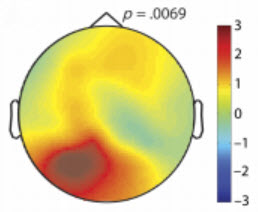How background electrical brain noise drives our decisions
June 17, 2014

Topographic map of alpha wave power in the left hemisphere of the brain in the period starting 800 milliseconds before a decision significantly influences the decision (credit: Jesse J. Bengson et al./Journal of Cognitive Neuroscience)
Our ability to make choices — and sometimes mistakes — might arise from random fluctuations in the brain’s background electrical noise, according to a recent study from the Center for Mind and Brain at the University of California, Davis.
The brain has a normal level of “background noise,” Bengson said, as electrical activity patterns fluctuate across the brain. In the new study, decisions could be predicted based on the pattern of brain activity immediately before a decision was made.
Bengson sat volunteers in front of a screen and told them to fix their attention on the center, while using electroencephalography (EEG) to record their brains’ electrical activity. The volunteers were instructed to make a decision to look either to the left or to the right when a cue symbol appeared on screen, and then to report their decision.
The cue to look left or right appeared at random intervals, so the volunteers could not consciously or unconsciously prepare for it.
The brain has a normal level of “background noise,” Bengson said, as electrical activity patterns fluctuate across the brain. The researchers found that the pattern of activity in the second or so before the cue symbol appeared — before the volunteers could know they were going to make a decision — could predict the likely outcome of the decision.
“The state of the brain right before presentation of the cue determines whether you will attend to the left or to the right,” Bengson said.
The experiment builds on a famous 1970s experiment by Benjamin Libet, a psychologist at UCSF who was later affiliated with the UC Davis Center for Neuroscience.
Libet also measured brain electrical activity immediately before a volunteer made a decision to press a switch in response to a visual signal. He found brain activity immediately before the volunteer reported deciding to press the switch.
The new results build on Libet’s finding, because they provide a model for how brain activity could precede decision, Bengson said. Additionally, Libet had to rely on when volunteers said they made their decision. In the new experiment, the random timing means that “we know people aren’t making the decision in advance,” Bengson said.
Free will?
Libet’s experiment raised questions of free will — if our brain is preparing to act before we know we are going to act, how do we make a conscious decision to act? The new work, though, shows how “brain noise” might actually create the opening for free will, Bengson said.
“It inserts a random effect that allows us to be freed from simple cause and effect,” he said.
The work, which was funded by the National Institutes of Health, was published online in the Journal of Cognitive Neuroscience.
Our ability to make choices — and sometimes mistakes — might arise from random fluctuations in the brain’s background electrical noise, according to a recent study from the Center for Mind and Brain at UC Davis. This video shows researchers recording brain activity as a volunteer performs a decision-making task.
Abstract of Journal of Cognitive Neuroscience paper
Ongoing variability in neural signaling is an intrinsic property of the brain. Often this variability is considered to be noise and ignored. However, an alternative view is that this variability is fundamental to perception and cognition and may be particularly important in decision-making. Here, we show that a momentary measure of occipital alpha-band power (8–13 Hz) predicts choices about where human participants will focus spatial attention on a trial-by-trial basis. This finding provides evidence for a mechanistic account of decision-making by demonstrating that ongoing neural activity biases voluntary decisions about where to attend within a given moment.